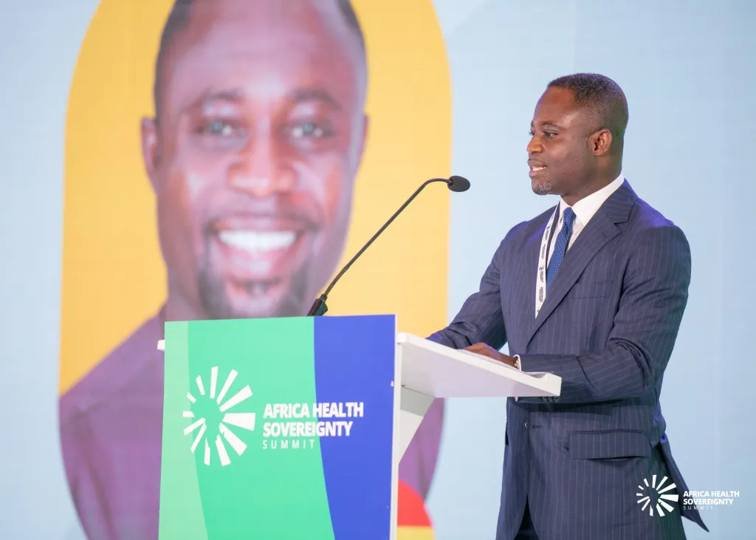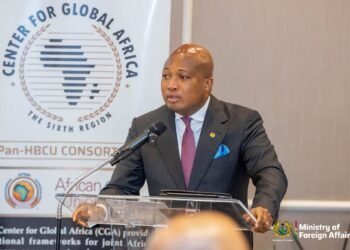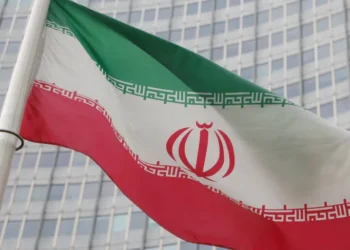Ghana’s Minister of Health, Hon. Kwabena Mintah Akandoh, has urged the international community to take urgent and collective action in tackling non-communicable diseases (NCDs) and mental health challenges, describing them as crises that can no longer be ignored.
Speaking at the High-Level Meeting on the Prevention and Control of Noncommunicable Diseases and Promotion of Mental Health and Well-being, held on the sidelines of the 80th United Nations General Assembly in New York, the Minister outlined Ghana’s bold approach to addressing the growing burden of NCDs and the stigma surrounding mental health.
In his address, Mr. Akandoh noted that behind every statistic lies a human story, stressing that the issues under discussion were not abstract figures but the daily lived reality of millions.
“The fight against non-communicable diseases and mental health issues is no longer a silent crisis. It is a daily reality for families, communities, and our healthcare system. Behind the statistics we share are real people, our brothers, sisters, neighbors, friends, and even ourselves”.
Ghana’s Minister of Health, Hon. Kwabena Mintah Akandoh
The Health Minister outlined Ghana’s integrated approach, built on strengthening primary healthcare, improving accountability, and addressing the broader commercial, social, economic, and environmental factors that drive health outcomes. He highlighted that Ghana had deliberately chosen to act boldly by embedding preventive and management strategies into its health system.
“We are integrating WHO’s PEN and PENPLUS frameworks into primary healthcare, training and empowering community health workers to manage hypertension and diabetes, embedding NCD risk assessment in routine services so people are diagnosed early, not too late,” he explained. He emphasized that early detection and preventive measures remain crucial in reducing the long-term cost of care and saving lives.
According to Mr. Akandoh, Ghana is also working to remove financial barriers that prevent families from accessing care. “Through the free primary healthcare and our Ghana Medical Trust Fund, we are breaking financial barriers so treatment does not push families into poverty,” he said. This, he explained, reflects the government’s belief that health is a fundamental right and not a privilege determined by economic status.
The Minister, however, stressed that Ghana’s response extends well beyond clinics and medicines. He underscored the importance of listening to people with lived experiences, particularly the voices of young people, in shaping responsive and inclusive health policies. “We are intentionally listening to people with lived experiences, especially young people, because their voices influence better policies and foster greater trust,” he told delegates.
Hon. Akandoh also called attention to the critical role of sustainable financing in the global fight against NCDs and mental health issues. He noted that without predictable funding, the progress made risks being undermined.
In addition to financing, he highlighted the urgent need to make essential medicines and diagnostics available in every community, warning that access gaps continue to undermine efforts to combat NCDs and provide mental health care.
The Health Minister further challenged governments and global institutions to take bold action on what he described as the “commercial determinants of health,” pointing to the influence of industries and market forces on public health outcomes. He argued that confronting these structural challenges would require courageous policies that go beyond traditional healthcare delivery.
“Success will depend on more than health ministries alone. We need sustainable financing, essential medicines and diagnostics in every community, and courageous action on the commercial determinants of health”.
Ghana’s Minister of Health, Hon. Kwabena Mintah Akandoh
Ghana’s presentation reflected a growing recognition of the interconnectedness of health with wider social and economic systems. By focusing on prevention, community-based approaches, and financial accessibility, Ghana’s model is seen as one that other countries in the Global South could adapt to meet similar challenges.
Non-communicable diseases, including cardiovascular diseases, cancers, diabetes, and chronic respiratory illnesses, have emerged as leading causes of mortality worldwide. According to the World Health Organization, NCDs account for over 70 percent of global deaths annually, with low- and middle-income countries disproportionately affected. Similarly, mental health challenges, long neglected in global health discourse, have seen rising prevalence rates, particularly among young people.
Ghana’s Health Minister stressed that these realities demand a shift in global priorities and resource allocation. He urged world leaders not only to reaffirm commitments but also to back them with practical actions that ensure no one is left behind. “This is about justice and dignity. It is about ensuring that people can live healthy, productive lives free from diseases that are preventable and conditions that are treatable,” he concluded.
Ghana’s interventions at the UNGA80 health meeting align with President John Dramani Mahama’s broader call for fairness, justice, and equity in international cooperation. By linking healthcare reform to issues of social inclusion and economic resilience, the government is positioning itself as a champion of holistic health approaches on the global stage.
As the meeting wrapped up, delegates agreed that tackling the dual challenge of NCDs and mental health requires a renewed global compact, one where financing, solidarity, and courage intersect to produce sustainable results. Ghana’s message was clear: the time for action is now, and the cost of inaction is simply too high.
READ ALSO: Ato Forson Commits to Decisive Action to Restore Development Bank Ghana’s Credibility


















